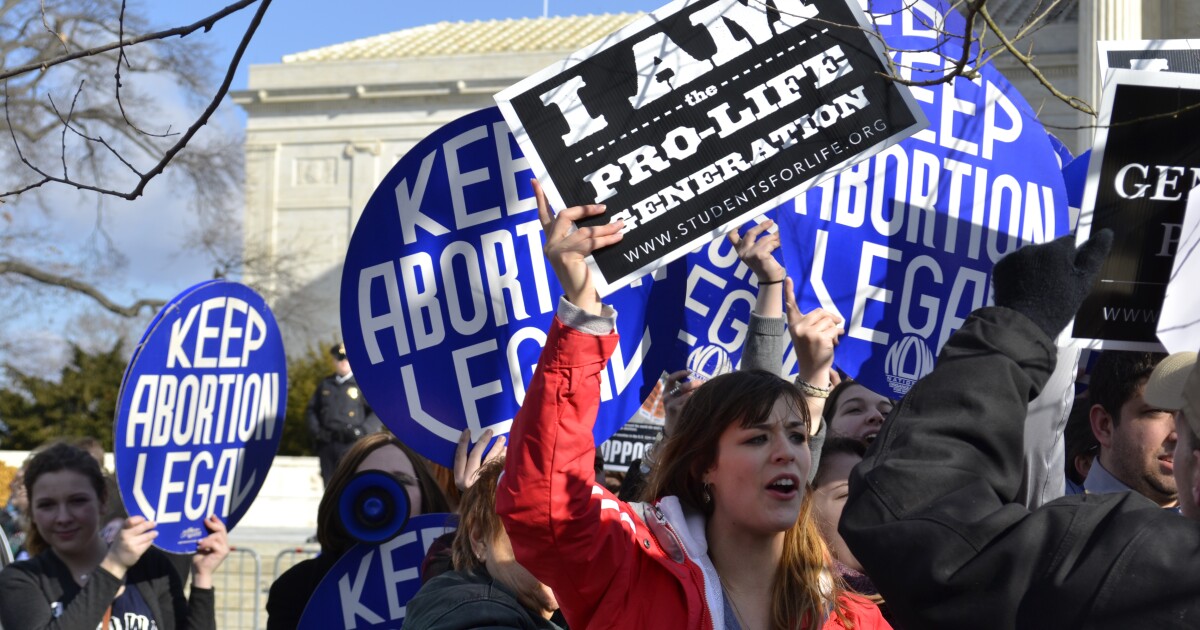

Pregnancy centers that help women seek alternatives to abortion have been promised over $250 million from state governments since the reversal of Roe v. Wade.
The public funds, which have been allocated for distribution between 2023 and 2025, is an increase from 2021-2022 funding for the centers, which was about $217 million, according to data from the abortion-rights groups Guttmacher Institute and Equity Forward.
FREEDOM CAUCUS WARNS GOP LEADERSHIP AGAINST ‘SHADY SIDE DEALS’ AS CONGRESS RETURNS TO SPENDING FIGHT
The funding comes as many states decided to restrict abortions and in turn fund the centers to encourage birth.
According to the Charlotte Lozier Institute, which supports pregnancy centers, a December survey of 2,750 centers across the country showed the groups had provided over $350 million in aid to pregnant women in 2022.
“In the Dobbs era, the demands upon pregnancy help centers have increased daily. Many states are responding with new funds and new policies to support the centers’ work. At the same time, new attacks are launched daily by violent radicals and by politicians who should know better,” CLI President Chuck Donovan said. “Some would find these challenges daunting, but as our report shows, pregnancy help center leaders see in this situation new opportunities to serve generously with love and compassion for those in need.”
Pregnancy centers are known for providing goods and services to pregnant women in need, such as educational and financial resources, healthcare support during and after pregnancy, and everyday items like diapers, baby wipes, formula, and clothing.
CLI says the need for the centers is increasing as part of an expanding “pro-life safety net” that met with clients over 16 million times last year.
In 2022, about $89 million in government funding was allocated to pregnancy centers in at least 18 states, according to Equity Forward, with more money on the way in the coming years.
As the Washington Examiner reported, Gov. Jim Justice (R-WV) recently tapped a network of pregnancy centers to administer a $1 million maternity support program. States like Louisiana and North Dakota have set up tax credits for the centers.
Arizona also decided to fund the centers to the tune of $3 million as of last year. Arkansas, Indiana, Oklahoma, and many others have decided to fund the centers to the tune of millions each. Some states, such as Oklahoma and Indiana, have been funding the centers for years prior to the overturn of Roe.
The centers have come under fire from supporters of legal abortion, who claim the centers’ “goal is to spread misinformation and propaganda,” according to abortion giant Planned Parenthood. Pregnancy centers often greatly outnumber abortion-providing centers, such as in Arizona where the ratio is 44-to-7 and Iowa where it is 43-to-6.
They therefore cut into the business model of abortion clinics, which make money off the procedures. That is why the abortion industry has come out so heavily against the centers since the overturn of Roe, pregnancy center supporters say.
Planned Parenthood, meanwhile, took the lion’s share of $2 billion in taxpayer dollars over the last four years, the Washington Examiner reported.
Pregnancy centers have also received federal dollars for their services under the Temporary Assistance for Needy Families program. President Joe Biden’s Department of Health and Human Services is trying to stop funding the centers.
Pregnancy centers have been challenged in several ways by politicians and groups that support legal abortion. Earlier this year, Gov. Jared Polis (D-CO) signed a bill making progesterone treatment, otherwise known as an abortion pill reversal, illegal in the state.
Such treatment is often cited by pregnancy centers as a possibility if a pregnant woman takes the chemical abortion drug mifepristone, regrets doing so, and seeks treatment in time to potentially reverse its effects.
CLICK HERE TO READ MORE FROM THE WASHINGTON EXAMINER
The abortion industry has recently started questioning the efficacy of progesterone treatment, which is a naturally occurring hormone during pregnancy and is used in a wide variety of pregnancy-related issues including the reversal of the drug, the Washington Examiner reported.
Colorado made the move, saying that advertising progesterone as a reversal amounted to a deceptive trade practice, meaning pregnancy centers would be liable for false advertising. Texas Attorney General Ken Paxton countered that claim, suing business ratings organization Yelp for deceptive trade practices and “disparage facilities that counsel pregnant women instead of providing abortions.”





